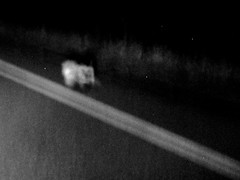A few weeks ago, I read Calvin Trillin's long article about his late wife, "Alice, Off the Page," in
The New Yorker. It was warm, engrossing and frequently hillarious. I finished the article wanting more.
I learned that Trillin is probably best known for his no-frills food writing and sought out his books on the subject -- but had no luck through the BPL. Instead, I borrowed
Killings. This collection is culled from Trillin's fifteen years writing the"U.S. Journal" column at
The New Yorker and is comprised of stories of killings from around the country.
Trillin uses the word
killings, I believe, because
murders passes a certain judgment that he skillfully avoids throughout. He doesn't seek out the big answers in these articles -- occasionally he doesn't know the motive and doesn't make guesses -- but the small ones, forcing us to reconcile the facts with the consequences. In one article we know almost everything about the specific event that led to the killing -- a rebelious teenage girl is in a speeding car driven by her boyfriend while her frustrated father, not sure that she's safe, chases them through the Tennessee backroads until he sees her car flip over and watches her last breaths -- but not who to blame the death on, the father or boyfriend.
Many of the individual articles are excellent but reading them as a collection, led me to overarching themes that I don't believe were even intended -- coming to these half realizations and dim epiphanies made me wonder if I'd come across the vague secrets known to the unlucky and depraved in every city of the country. For example, early in the book's last essay, "A Father-Son Operation," Trillin writes of a great farmer, saying he was:
One of the best -- one of the best, that is, until his life began to change in ways that his neighbors still can't explain ...
Trillin tells us what these changes are and what some of the causes were, or might have been, but in this story and others, there's a feeling that a darkness has entered a person's life and though (in some cases) there's no doubt as to their guilt, it also seems that this change, this darkness, was an inevitability and that they never had a chance.
Killings wasn't the book I expected it to be. Trillin gets on top of why that is just a few pages into the introduction:
What I was interested in, of course, was writing about America -- or, as I realized just a few years after I began "U.S. Journal," in writing about America without an emphasis on politics and government. Some ways of doijng that didn't suit my needs. I wasn't interested in doing what is sometimes called Americana -- stories about people like the last fellow in Jasper County, Georgia, who can whittle worth a damn.
And when you put it in those words, well, I didn't want that either. But it is more of what I expected from the man I understood to be the guy who wrote funny about Kansas City BBQ and greasy NYC Chinese food.
What
Killings turns out to be, despite purposely avoiding comprehensiveness and equal representation, is a portait of the country, perhaps as much today as when the book was published in 1984 or when the first article was written in 1969, a country that is both the inevitable cause and effect of these killings.

